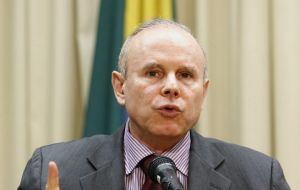MercoPress. South Atlantic News Agency
Brazil planning new intervention measures to curb its currency appreciation
 “It’s a hot economy, but not too hot”, says Guido Mantega
“It’s a hot economy, but not too hot”, says Guido Mantega Brazil's government may intervene in futures markets to weaken the Real, Finance Minister Guido Mantega told reporters in London on the sidelines of a conference on Tuesday.
President Dilma Rousseff's government is concerned by the currency's strength, which is being caused by external market conditions, Mantega said.
“We are worried by the Real appreciation,” Mantega said. “The government has taken action in the spot market, and we could also take measures in the derivatives market, and the futures market.”
“The problem is that monetary policy in advanced economies is too relaxed. These countries are not recovering. They have a problem of growth. That's why money flows to emerging countries,” Mantega said.
The Rousseff administration has repeatedly expressed concern about the damage the strong Real is doing to the country's manufacturing industries. Mantega last year accused rich nations of provoking a “global currency war” by keeping interest rates close to zero, causing a flood of liquidity into emerging markets.
Brazil's Real appreciated on Monday to its strongest level since 1999, as expectations that Greece may resolve its debt crisis increased demand for higher- yielding assets. The Real has gained 49% against the U.S. dollar since the end of 2008, the best performer among 25 emerging market currencies tracked by Bloomberg.
In October, Mantega tripled to 6% a tax on foreign investors' fixed-income purchases. On March 29, President Rousseff's administration increased to 6% a tax on new corporate loans and debt sales abroad by banks.
A few days later, she applied the higher tax to renewed, renegotiated or transferred loans of up to two years. Companies previously paid a 5.38% tax on loans up to 90 days and zero tax when the term exceeded three months.
Mantega insisted that no credit and capital market bubbles were forming despite Brazil's robust economic expansion.
“It's a hot economy but not too hot ... Credit is growing at a rate lower than last year. We have decelerated the economy,” he said, adding that Brazil's 2011 growth rate of 4.5% was in line with that of other emerging economies.
”As far as inflation is concerned, the rate is decreasing. All indicators point to the deceleration of inflation. Next month, inflation will be lower because commodities (prices) are lower, fuel and gasoline prices are lower,“ he said.
Brazil has moved to rein in rising consumer prices. The central bank has raised interest rates four times so far this year by a cumulative 150 basis points, to 12.25%.
”We have always taken measures to adjust growth to our potential ... If necessary the central bank will keep raising interest rates, but that's the decision of the central bank,”
Mantega added. He also said the country had achieved more than half of its primary surplus target this year.




Top Comments
Disclaimer & comment rules-

Read all commentsWhats Artura got to say about this? We need a laugh.
Jul 06th, 2011 - 07:15 pm 0Commenting for this story is now closed.
If you have a Facebook account, become a fan and comment on our Facebook Page!